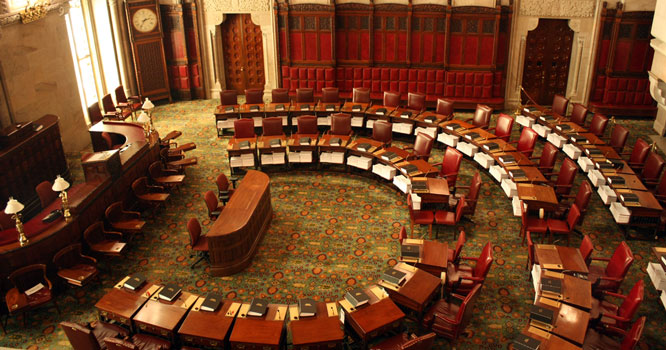New York Isn’t Ready for a Constitutional Convention
New York Isn’t Ready for a Constitutional Convention
Without a much larger movement to overcome New York’s political machine, a constitutional convention risks rolling back progressive victories—not adding to them.

All too often state constitutional conventions are failures. They aspire to revolutionize politics, but instead they are dominated and hijacked by the same political class that was the problem in the first place.
This is the likely outcome facing New Yorkers if they vote tomorrow, November 7, to hold a constitutional convention in the state. Historically, such conventions have only been successful at creating real change when backed by a new political movement. No such movement exists in New York today—at least not on the scale necessary—making a constitutional convention more of a liability than an opportunity for the left.
The New York State Constitution requires that every twenty years, voters have the option to vote on whether to hold a convention. A recent New York Times headline framed the divide on this year’s vote as one between optimists and pessimists. Let’s be realists. We don’t make bets in a vacuum; we look at the cards and analyze the odds of success or failure.
New York voters drew an awful hand. Conventions, whether in the United States or abroad, manage to enact constitutional revolutions when they are backed by new and insurgent political movements. Individual desire for change, as a private citizen or as an aspiring candidate, is not enough. The idea that the preexisting “people,” in the form of a left-wing majority is sleeping and that the convention will jolt them awake to take back their state is a fantasy. Albany’s politicians are well funded and organized; they will not give up their current system without a fight. What’s necessary to overcome them is a political movement that can recruit, promote, and campaign on behalf of new candidates. No such movement exists today, at least at the scale needed to shift the balance of the “con con” process. This means that the convention risks not merely reinforcing the status quo, but allowing the better-organized and -financed right to roll back some of New Yorkers’ existing, hard-fought constitutional rights—while leaving the worst of the state’s political machine intact.
Proponents of the convention have the order of causality reversed. The constitutional convention is not a magic button for change. Rather, political movements infiltrate and realign the existing parties, giving birth to a new set of elites that may use the convention to overcome the old ones.
New York’s own state constitutional history bears this out. The state’s Constitutional Convention of 1915 was held at the height of the progressive era. Theodore Roosevelt, founder in 1912 of the Progressive Party, had recently served as governor of New York, and Woodrow Wilson was president. Dominated by progressives, the Convention proposed incredibly far-reaching changes to the constitution in the name of efficiency and modernization. Voters ultimately rejected the changes in a referendum, but over the next thirty years the progressive leaders of the convention, who were entrenched in normal politics, managed to achieve enact many of the Convention’s proposed changes anyway through amendments.
The constitutional changes proposed by the 1938 New York Convention likewise bear the imprint of the New Deal and the influence of organized labor. The governorship was held by Herbert Lehman, who was trying to institute the “Little New Deal.” Even though Republicans had the majority of the seats in the Convention, New Deal Democrats, led by Robert Wagner and Robert Moses, convinced middle-of-the-road Republicans to create the first New York Constitution that provided substantial social welfare rights. Not only was labor’s power at its height, but it had its own political party, the American Labor Party, whose influence in the selection of delegates helped sway the Convention to include a Labor Bill of Rights.
The same pattern holds abroad. South America is the central and most revolutionary site of conventional constitution-making after the end of the Cold War. In all four countries where this took place (Venezuela, Bolivia, Colombia, and Ecuador), presidents representing new parties pushed for the convention and their allies dominated it.
Conventions do make a difference. The checks and balances of the normal political process, such as bicameralism, the governor’s veto, and the House and Senate’s leadership’s agenda-setting powers, create gridlock. None of those features are present in conventions. New political movements, whose ideas die slow deaths in the legislature, may use the efficient convention to enact or consolidate sweeping change.
Does such a political movement exist today? In our national politics, it might seem we’re just on the cusp. On the left, Bernie Sanders’ group Our Revolution has recruited candidates for both the last and this current set of state elections. But its results so far have been mixed at best. It certainly lacks the heft necessary to dominate a convention. Meanwhile, the other group best positioned to tilt a New York “con con” to the left, the Working Families Party, has come out against it, stressing that the odds in the process are weighted heavily to the right. And further-left groups such as the Democratic Socialists of America as of yet lack a sufficient base to mobilize for a convention that would make the state more, not less, egalitarian.
The time is not ripe for a convention. For now, the best citizens can do is volunteer to support nascent political movements that may begin enacting change within the conventional avenues of New York politics. If that effort were successful, at their next opportunity, twenty years from now, New Yorkers should support a convention so that it may be used to put the last stake in the coffin of the old political machine.
Joshua Braver is a postdoctoral fellow at Tufts University in political science, civic studies, and philosophy. He holds a J.D. from Yale Law School and a PhD from Yale Political Science.






